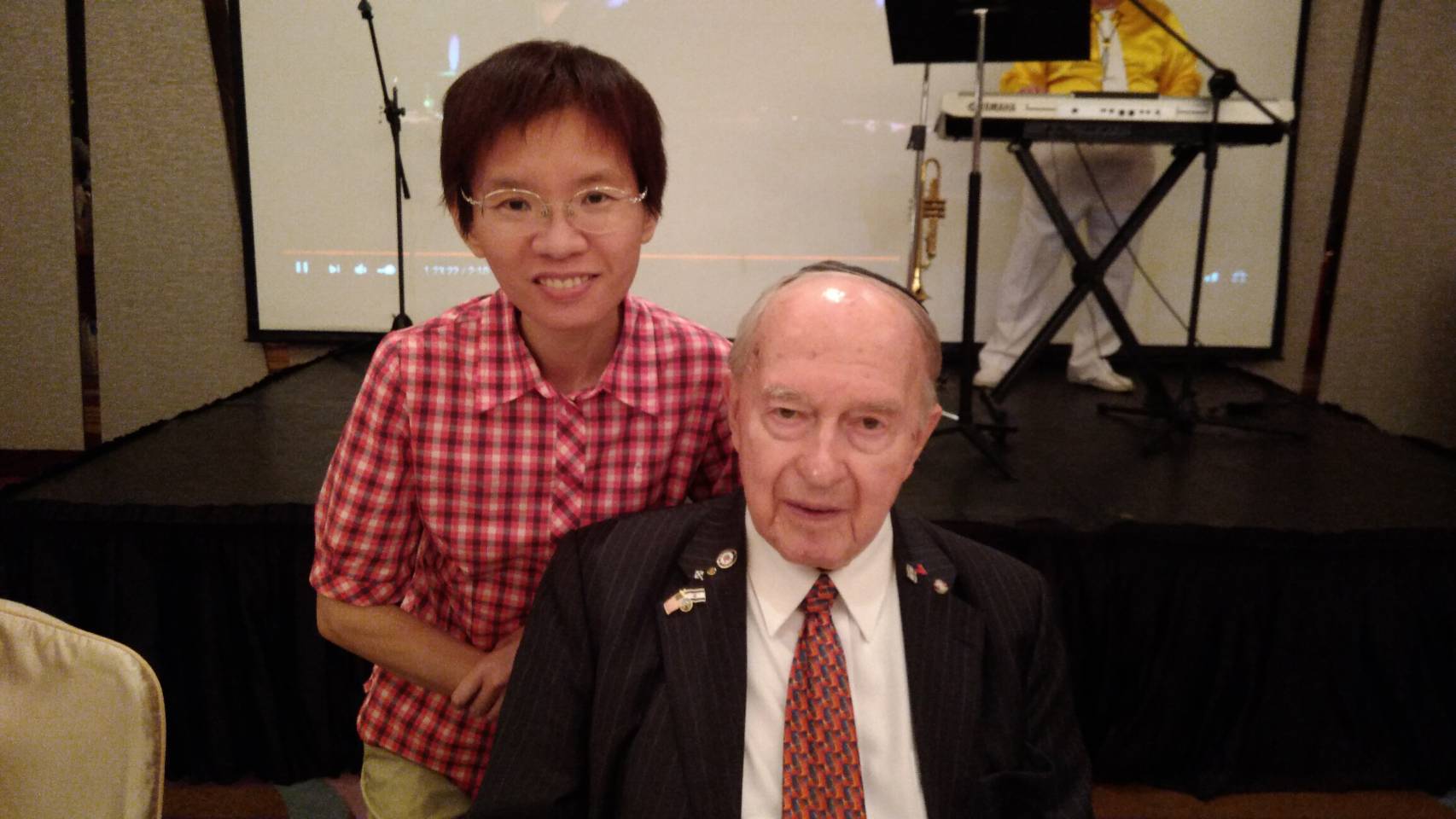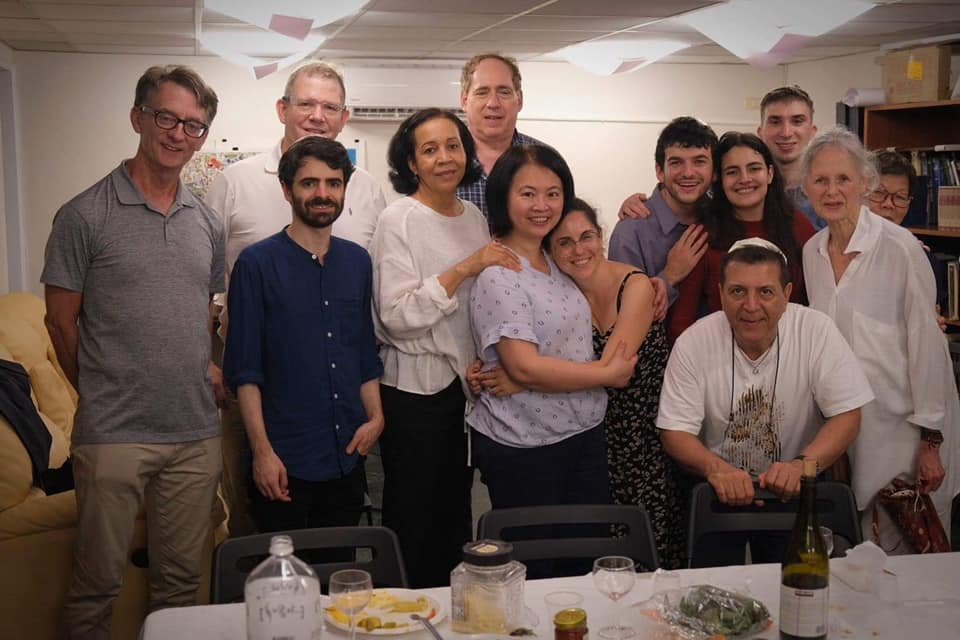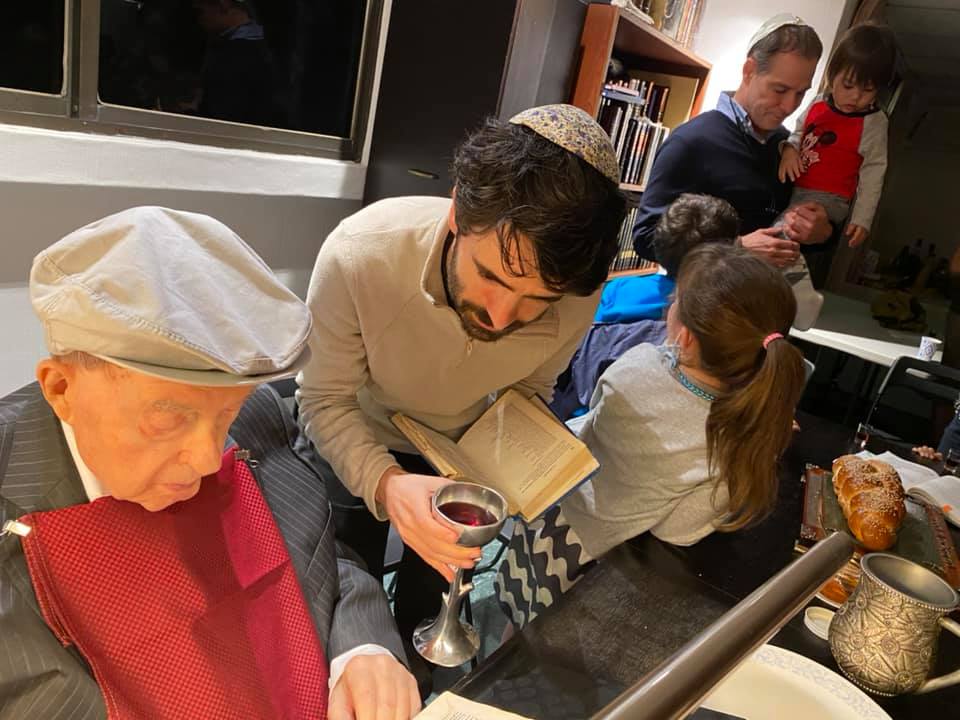Modern Day: 2000s-Present
 The Taiwan Jewish Community’s Purim party in 2021. Courtesy Taiwan Jewish Community.
The Taiwan Jewish Community’s Purim party in 2021. Courtesy Taiwan Jewish Community.In the early 2000s, the Taiwan Jewish Community closed its center and merged with Rabbi Ephraim Einhorn at the Ritz Hotel (which later became the Landis), having caved under financial pressure as well as the continuing decline in membership. Donald Shapiro, who came to Taiwan as a journalist in 1969 and later worked for AmCham Taipei, had assumed leadership as President in 1988 and remained into the 2000s, unknowingly violating the organization’s constitution and drawing attention from the city government. But the issue was quickly resolved with the help of a lawyer and the Taiwan Jewish Community returned to good standing with the government.
Attendance at services remained low for more than a decade, compared with the years compared to the “golden days” of the 80s and 90s, though a dedicated group of members attended nearly every week and for every major holiday event held at the Taipei American Club, which drew far more people. The period was also marked by a series of location changes. In 2008 the community moved from the Landis to the Taipei Sheraton Grand Hotel, where it remained for a few years before the hotel could not house it anymore. Jewish businessman Jeffrey Schwartz, who had lived in Taipei since the early 1970s and was a regular donor, offered a space in his office building. There the community stayed until 2020, when it found a new space in an office building on Fuxing North Road in the center of Taipei.
Those who remained included several members who are now community leaders or board members, including Benjamin Schwall, Brett Aaron, and Monica and Yoram Aharony. Some services during this time period did not have enough people for a minyan (services were held regardless) and were sometimes disproportionately attended by Christians, who were always welcome at Einhorn’s services. According to an observation by Goldstein, these attendees were “passionately philosemitic and Zionistic” and have no wish to convert, “but several regular attendees have been converted by Einhorn.”1
Einhorn’s converts include a former Christian who found her way to Taiwan’s Jews, but are mostly spouses of foreigners. They have also been subject to debate within the community. Some Jewish converts interviewed by the author say they don’t feel “really” Jewish after Einhorn’s conversion, which consisted of a few months of study and a ceremony before three Jewish witnesses within the community, according to those converts. One of these is Monica Aharony, who has been part of the community since she met her husband, Yoram, in the 1980s. Despite her conversion under Einhorn and longtime involvement, she still hopes to undergo a formal Orthodox conversion: “My wish is to go to Jerusalem and study to be a proper convert. Not just to be a convert, but because I want to know more. I’m already 68. If God gave me life ‘till 80, this is my wish.”2
 Zoy Chang, a Taiwanese woman who has been involved with the Jewish community since the early 2000s, pictured with Rabbi Einhorn, who converted her in 2011. Courtesy Zoy Chang.
Zoy Chang, a Taiwanese woman who has been involved with the Jewish community since the early 2000s, pictured with Rabbi Einhorn, who converted her in 2011. Courtesy Zoy Chang.The conversions also allegedly caused a rift between Einohrn and the TJC in the late 80s; many disagreed with him at the time, though pushback these days comes mainly from Taipei’s Orthodox Chabad community, which has declined Jewish services like circumcision and bar mitzvahs to those viewed as not halachically Jewish. Chabad’s services are also generally restricted only to those who are Jewish according to halacha -- a policy consistent with Chabads around the world -- but Rabbi Shlomi Tabib opens larger events like holidays to the greater community. In 1991, the number of young Jews with Taiwanese wives was estimated at “as high as forty percent,”3 while present day estimates put the number as high as 85 percent.4 The debates regarding conversion and intermarriage, as well as other disagreements between leadership, have led to strong dividing lines between the two communities today; leadership of the two groups had attempted to collaborate in the past but as of this writing rarely communicate with one another.
Shlomi Tabib arrived in Taipei in 2011 with the original intention of assisting Dr. Einhorn with the existing community. However, according to Tabib, “His answer was, maybe you guys should do your own thing, and we keep doing our thing.”5 A Chabad house was opened in Taipei’s Da’an district to the excitement of Taiwan’s Jews, who were desperate for Jewish life. By that time, Einhorn was getting older, members recall, and his services were becoming dry and were not suitable for children. “There was nothing here,” Tabib recalls. “The Jews used to congregate twice a year at Passover and Rosh Hashanah. But [as for] Hanukkah, Purim, Lag B’Omer, Shavuot, Sukkot, [there was] nothing. Nothing was here.”6
While Tabib was able to fill a major gap in Taiwan by gathering a minyan every week, importing more kosher meat through Costco, and starting a Sunday school, some Jews, who were married to Taiwanese people (some converted, some not) and had Taiwanese-Jewish children, were not getting what they had hoped from Chabad. Tabib had declined finding a mohel to lead a circumcision ceremony for a member’s son, whose wife was not Jewish. Others had had their requests for a bar mitzvah for their child declined for similar reasons. A small group decided to band together to revitalize Einhorn’s dwindling community and create a more progressive and welcoming one. In 2020, they recruited Leon Fenster, a hazzan and artist who had spent time in Beijing. According to current president Benjamin Schwall, Fenster’s leadership style, as well as the addition of food to Friday evening services, reinvigorated the community and drew numbers the community hadn’t seen in decades.7
In 1985, before Liberman left Taiwan, he wrote: “...the spirit of permanency must be imbued. This can be done by establishing a Centre fully owned by the community. With the enthusiasm of our members and the confidence won from our friends - this is now in the realm of possibility.”8 Unfortunately, it didn’t actually become a possibility until very recently, likely due to the financial hardships, fluctuating membership and skyrocketing rent costs experienced by the community. But in 2018, Jeffrey Schwartz began carrying out a plan to construct Taiwan’s first permanent Jewish community center in Taipei: the Jeffrey D. Schwartz Jewish Community Center, with an attached synagogue led by Chabad Rabbi Shlomi Tabib. The center, scheduled to open at the end of 2021, reportedly cost $16 million9 to build and will feature classrooms, a kosher restaurant and kitchen, a banquet hall, and a mikveh. It has also brought to the fore ideological differences that have long existed within the community, with TJC members labeling Schwartz’ project nothing more than a Chabad house likely to continue excluding non-Jewish family members or converts. TJC, which has not been invited to host its own religious services in the center due to Chabad’s presence -- though has been invited to host events and use the building’s other venues -- has said at the time of this writing that they will remain separate from Schwartz’ center and continue to host its large events at other venues like the Taipei American club.10 Schwartz maintains that the center is non-denominational and welcome to all who want to participate in events, including any Taiwanese who want to learn about Judaism.11


In 2020, when the COVID-19 pandemic sent most countries into lockdown, life in Taiwan remained almost normal due to the government’s early attention to the growing outbreak in China, border restrictions, and widespread testing, contact tracing and masking policies. Jews in Taiwan were able to go on with events, including large holiday events for Purim and Passover in early 2021 at the Taipei American club as many across the rest of the world had socially-distanced Zoom seders. Taiwan experiences a brief semi-lockdown in the summer of 2021, but the community quickly bounced back in the fall. As of this writing, an estimated 600 Jews reside across Taiwan.
Sources
- Goldstein, Jonathan. “Taipei: An Oasis of Tranquility for Americans, 4 Europeans, and Israelis.” Essay. In Jewish Identities in East and Southeast Asia: Singapore, Manila, Taipei, HARBIN, Shanghai, Rangoon, and Surabaya, 96. Berlin, Germany: De Gruyter Oldenbourg, 2015.
- Aharony, Monica (TJC member and Taiwanese Jewish convert). Interview with the author. May 11, 2021.
- Bullivant, Brian. “Jewry in the Little Dragon’s Den: Cultural Constructions of Jewish Communities in Asia.” (unpublished report to the Australian Institute of Jewish Affairs, 1991), typescript.
- Schwall, Benjamin (current TJC president). Interview with the author. April 14, 2021.
- Tabib, Shlomi (Chabad of Taiwan Rabbi). Interview with the author. April 18, 2021.
- Ibid.
- Schwall, Benjamin (current TJC president). Interview with the author. April 14, 2021.
- Bullivant, Brian. “Jewry in the Little Dragon’s Den: Cultural Constructions of Jewish Communities in Asia.” (unpublished report to the Australian Institute of Jewish Affairs, 1991), typescript.
- https://www.timesofisrael.com/taiwan-to-open-its-first-ever-permanent-jewish-community-center/
- Schwall, Benjamin (current TJC president). Interview with the author. April 14, 2021.
- Schwartz, Jeffery (founder of the Jeffrey D. Schwartz Jewish Community Center). Interview with the author. March 19, 2021.